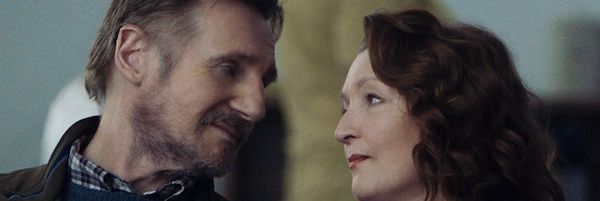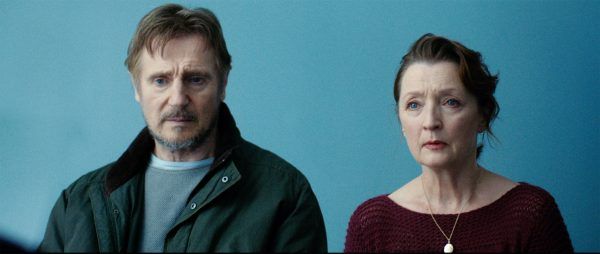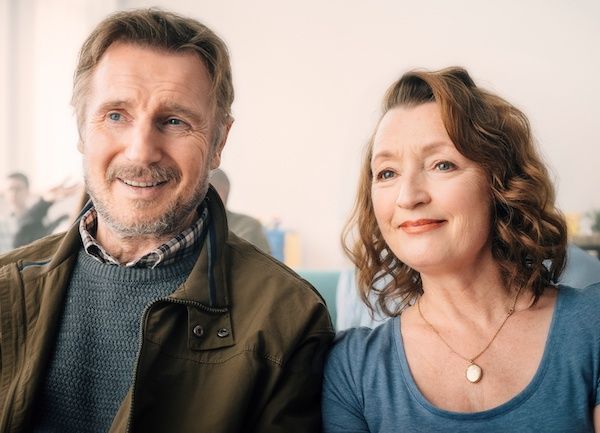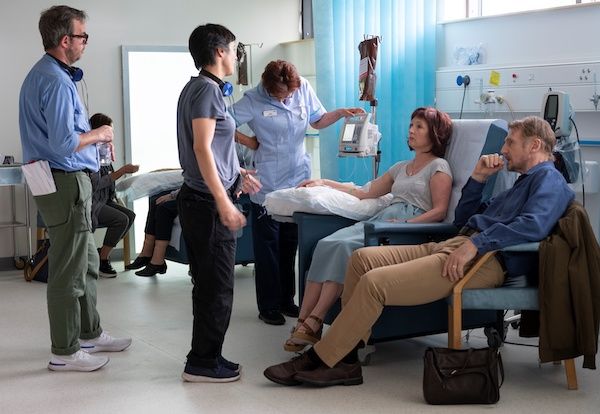From directors Lisa Barros D’Sa & Glenn Leyburn and inspired by the life experience of screenwriter Owen McCafferty, the life drama Ordinary Love tells the story of Joan (Lesley Manville) and Tom (Liam Neeson), an everyday couple who have been married for many years and still love each other very much. When Joan is diagnosed with breast cancer, the journey of her treatment highlights their devotion, as they find the best way to survive a life-changing year.
During this phone interview with Collider, co-stars Neeson and Manville talk about why they liked the story of Ordinary Love, how U2's Bono got the script to Neeson, telling a love story about the heart of a longtime relationship, what they enjoyed about the experience of working with each other, collaborating with a directing duo, and what’s next for each of them.
Collider: I thought you both were so terrific in this film. It’s really such an incredible film. When you got this script and read it, did you know what a personal story it was for the screenwriter, Owen McCafferty, and did that make it feel weightier for you, as actors, when you’re doing something that comes from such a personal place?
LESLEY MANVILLE: We did know that it was the experience that Owen and his wife, Peggy, had been through. But you’ve got to be careful, when making a film like this, because if you sentimentalize it, you’re not doing the people who go through it justice and you’re not presenting it in the right way. The authenticity of the script, which obviously was because Owen is not only just a great writer, he’s a well-known, established theater writer, principally. It’s his first film, and he put down his story, really, on paper. And he dramatized it, obviously, to lift it to be perhaps more filmable. But we knew that it was his personal story.
Would you say that the truth to an experience like this is that there is no one truth, and that it’s the little details and little moments that make an audience find it relatable?
LIAM NEESON: We had professionals and counselor specialists that spoke to Lesley about the processes that her character has to go through. All of that was real. For me, when I first read the script, it literally was a page-turner. I started at page one and finished the script and thought, “This is beautiful. This is a love story.” Yes, cancer is in the background. I have personal experience with it. There are four members of my family and my wife’s family that have passed away from it. Lesley has a similar experience with it. The writing was very truthful and pure and beautiful. It’s a love story that we often don’t see in cinema, of two middle-aged people who’ve been together and married for 30 years, and still adore each other’s company.
Does it feel like there’s a challenge in telling a love story that you’re not telling the beginning of or the end of, and you’re just showing the heart of this relationship?
MANVILLE: Yeah, that’s a good point, actually. It’s not about dramatic meetings, or sentimental endings. There were things that you could read on the page and go, “Well, that’s not very good. They go to the supermarket to buy tomatoes.” But that’s ordinary life. It’s two people, just getting on with things. I’ve always felt, as Lesley, that life is full of lots of things that are very, very regular and ordinary. It’s not full of Valentine’s Day dinners and romantic stuff. If you’ve gotta get the laundry done or stack the dishwasher or make the bed, you might as well do it with, with some joy. Even though Joan and Tom have had a great tragedy in their life, losing their daughter, and now they’re facing this new tragedy, they are two people who have brought humor into their lives, have humor in their lives, and have a profound friendship. They make going to the supermarket nice for each other, even though it’s not, in the grand scheme of things, an exceptional thing to do.
Liam, I read that this script apparently originally got sent to you via Bono from U2. How does that happen? Does Bono typically scout film roles for you?
NEESON: He’s my other agent. No. He’s a pal, and the producer of the film sent Bono the script because they’re pals. Bono read it and got in touch with me about it. He said, “You should read this. It’s a real page-turner.” And it was a page-turner. So, I thought it would be terrific to do, especially when I heard Lesley Manville was going to be involved. It was a no-brainer.
This film brings the two of you together, as actors, for the first time. What did you enjoy about sharing the experience with each other, and in what ways did you find that you’re fans of each other?
NEESON: Lesley and I just clicked with each other. We didn’t interrogate the scenes, to any great depth. We just trusted the fact that, between the pair of us, we’ve got a number of years of experience, in theater, television and film, and we just allowed that experience to breathe, and shared that with each other.
MANVILLE: We didn’t over analyze it. I was really grateful for that because it’s instinct and what you get off of each other. It’s a risk, when you cast two actors that don’t know each other, to do something intimate, and they got lucky because we did just hit it off and it was all easy. I know that’s a really strange thing to say about a film with such difficult subject matter and definitely challenging scenes, but we just got on with it. There was never any going up and saying, “I’m going to do a difficult scene now, so don’t talk to me.” The crew were incredibly sensitive to all of that, and they were so good because they knew that we were two people who weren’t going to make a fuss about it, and that we’d just go on and do it.
NEESON: She’s a very easy person to love.
You talked about how great the script was, but there’s also the other puzzle piece of directors, and what they do with the material and what their vision is. When you spoke to the directors, Lisa Barros D’Sa and Glenn Leyburn, what made you feel like you were in the right hands, for a story like this?
NEESON: I’d never worked with a husband and wife directing team before, other than Joel and Ethan Coen. No. They’re two brothers. So, this was a first for me. Glenn was very much the technical guy, behind the camera, and Lisa was more engaged with us. The two of them have only made two films together, but they had a maturity and a vision. They were lovely to work with and very, very easy to work with. And they quickly got Lesley and my style of working, for want of a better word. I don’t know what I mean by style, but we had no egos. Egos were left at the front door, in the mornings, at the hotel. We were there to serve the script and serve the directors, and that’s what we did.
Your directors have previously talked about how, the more that they stripped things back to the essential elements, the more power they felt the story had. As actors, does it feel empowering to strip all of that away? Does it make you feel more naked without anything to hide behind, or does it feel like it gives more to the story?
NEESON: There’s an expression that less is more. It always goes back to the script. It really does. If it ain’t on the page, it ain’t on the stage, the saying goes. It was a powerful, beautiful, touching script with a lot of wit and humor. It was based on the writer and his wife, who went through something similar, for a year to a year and a half. I know that Owen had to be coaxed, for a period of time, to write the piece, which is understandable, but he did. I’ve made 63 or 64 movies now, and it’s probably one of the better scripts that I’ve read.
What’s next for both of you? Do you know what you’re going to be working on next, or are you working on something now?
NEESON: I’m doing a film, at the moment, up in Winnipeg, called The Ice Road, which is inspired by the old French classic film The Wages of Fear, that was made in the ‘50s. So, last week, it was 34 degrees Centigrade and I was fighting a guy on Lake Winnipeg. From the sublime to the ridiculous. I’m a quarter way through that. I have a few more weeks to go.
What’s it like to switch gears like that? Is it fun to do something dramatic, heartfelt and emotional like Ordinary Love, and then go off and fight some guy on a lake in freezing weather?
NEESON: Absolutely, it’s fun and they’re paying me a fortune.
MANVILLE: Conversely, I’m working at the National Theatre, and not being paid very much.
NEESON: Lesley’s doing a play that’s three and a half to four hours long, and apparently does not draw breath, from when the group goes up. I’m filled with admiration and cannot wait to see it, when I wrap in Winnipeg.
Lesley, what is the play that you’re doing, and what made you want to dedicate yourself to that, right now?
MANVILLE: I’m a glutton for a play. It’s almost like the harder and the more challenging it looks, the more I seem to like it, but that’s the nature of me, I guess. The play is called The Visit, and it’s Tony Kushner’s adaptation of a play written in the ‘50s by Friedrich Dürrenmatt. In a nutshell, it’s about the world’s wealthiest woman, who’s come back to the town where she was born and ejected from, as a pregnant teenager, and wronged, and she comes back to seek revenge. It’s good.
Ordinary Love is now playing in theaters.




